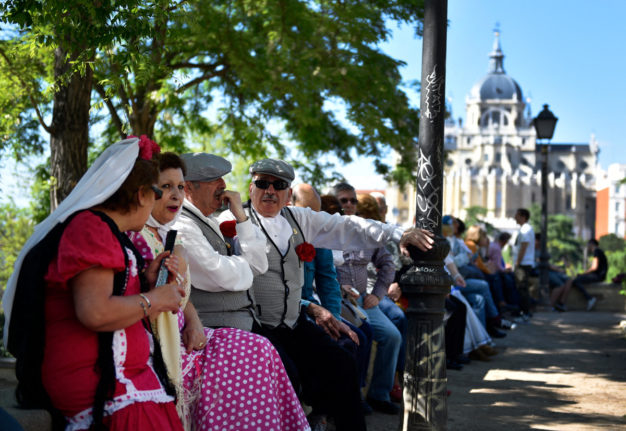According to EU Council data published on November 6th, the highest life expectancy for women in the EU in 2021 was in the Community of Madrid (88.2 years).
When it came to the male rankings, the highest figure for life expectancy at birth for men was recorded in the autonomous island region of Åland in Finland (82.8 years), but this was closely followed by men from Madrid (82.2 years).
Spaniards from other regions also live longer than most of their European counterparts. Women from Navarre (87.6 years), Castilla y León (87.5 years), Cantabria (87.1 years), Galicia and the Basque (both 87.0 years) completed the female top six rankings, and men from Navarre have the third highest life expectancy in the EU (81.9 years).
READ ALSO: One in five people in Spain are now over 65
But Madrileños living so long seems to go in the face of conventional wisdom with regards to city versus country living.
Surely living in the capital city, surrounded by millions of people in the hustle and bustle, with smaller living spaces, more pollution and a higher cost of living and stress, would not mean that people live longer?
Not in Madrid. In fact, new research by Spain’s Higher Centre for Scientific Research (CSIC) has revealed that there are more elderly people living in the two biggest cities of Madrid and Barcelona than there are in all small rural municipalities with dwindling populations. In Madrid and Barcelona, there are approximately one million people over 65; compared to the 765,446 who reside in the 6,000 rural municipalities of Spain.
So why is it people in Madrid live longer on average than anywhere else in the EU?
Wealth and private healthcare
As is the case in most countries around Europe, people who live in capital cities tend to be wealthier than elsewhere. In Spain, this is certainly the case. Madrid had the highest GDP per capita in the country with €34,821 per inhabitant, according to figures from Spain’s National Statistics Institute
Crucially, being wealthier allows more people to access private healthcare. It should be said here that Spain is widely regarded as having one of the best public healthcare systems in the world, something that undoubtedly plays a role in the long life expectancy of Madrileños.
However, being able to choose between public and private healthcare can be even more pivotal, especially in order to avoid long waiting times to see a specialist or a doctor.
Public and private healthcare in Madrid has been a controversial topic in recent years, and stems from the ‘liberalisation’ of the healthcare market in the region pushed by right-wing regional President Isabel Díaz Ayuso.
By autonomous communities, Madrid leads the ranking (40.1 percent) when it comes to private health insurance policy holder, according to figures from El Periódico de España.
It also has the lowest death rates in Spain due to tumours and cardiovascular diseases.
Even though life expectancy in Madrid ranks highly overall, it is worth noting that the capital also has considerable internal disparities. In the Chamartín neighbourhood, for example, the average man lives until he is 84.3 years old, whereas in Puente de Vallecas it is just 81.3 years, according to figures cited by La Razón.
The Spanish secret to a long life
It’s hard to fully understand why Spaniards live so long, but according to the scientists it’s a combination of their Mediterranean diet, a good healthcare system, plenty of walking, a close-knit society and a helpful serving of hedonism.
Genetics, a love of sport as well as the lack of serious social issues and wars also have also played a role in making Spaniards live longer.
Additionally, over the past decades Spain also managed to drastically reduce the number of deaths due to cardiovascular diseases. Imagine if they cut down on drinking and smoking – Spaniards could no doubt live even longer.
In fact, from 1915 to 2015 life expectancy in Spain doubled, from 42.6 to 84.5 years in women, and from 38.8 to 78.5 in men.
In 2021, a study by the University of Washington’s Institute for Health Metrics and Evaluation predicted that Spain would surpass Japan to boast the world’s longest life expectancy by 2040.
According to Spain’s main stats body (INE), by 2050 Spaniards will be nearing a life expectancy of 90.



 Please whitelist us to continue reading.
Please whitelist us to continue reading.
Member comments